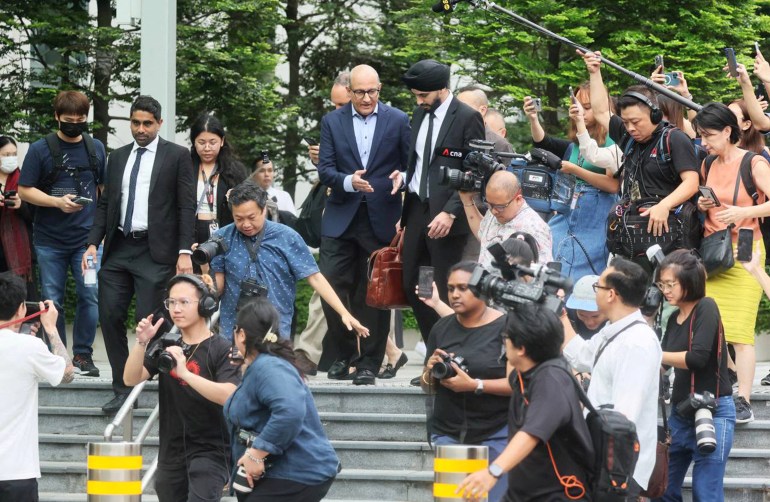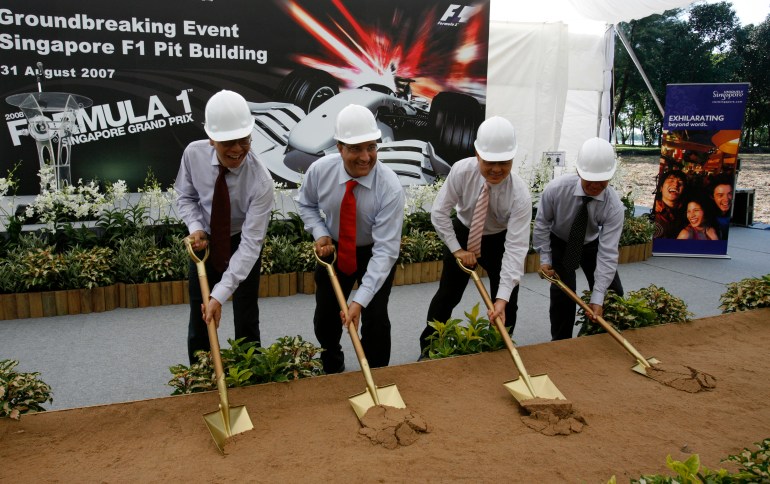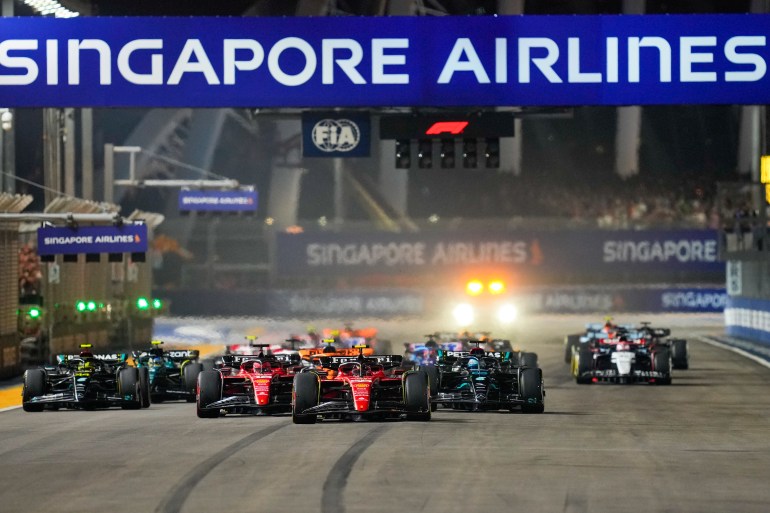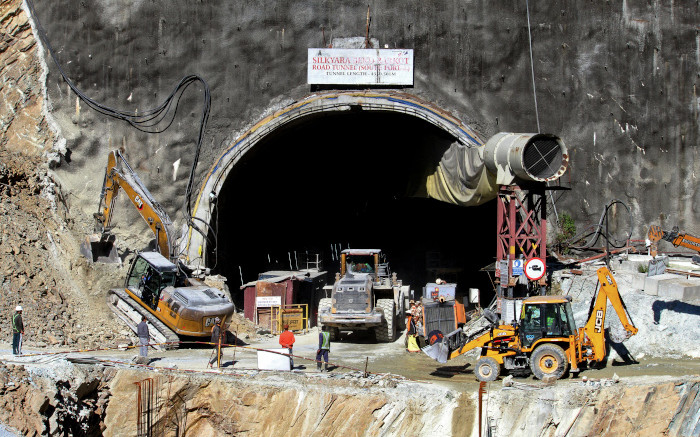Singapore – Hamilton in the West End, Arsenal v Tottenham Hotspur at the Emirates Stadium and The Curious Incident of the Dog that night.
That might sound like the itinerary for a fun weekend in London, but in Singapore they’re part of a rare corruption case involving a high-ranking politician.
Former Cabinet minister S. Iswaran is said to have received gifts worth more than 380,000 Singapore dollars (US$283,000) from Malaysian billionaire Ong Beng Seng, including tickets to West End shows and football matches, some in exchange for sponsorship Ong’s business interests.
Ong was the driving force in bringing the Singapore Grand Prix to the city-state in 2008 and owns the rights to the night race.
Tickets for the Grand Prix were listed on the charge sheet as gifts allegedly received by Iswaran.
When Iswaran appeared in court last month, he denied all 27 allegations against him and later resigned from the government.
In a resignation letter to Singapore Prime Minister Lee Hsien Loong, Iswaran said he would “focus on clearing my name” and paying back all salaries and benefits he has received since investigations into his alleged corruption began last July.
While Lee has vowed to uphold Singapore’s “reputation of honesty and incorruptibility,” the case has rocked the small Southeast Asian country known for its political stability.

With elections looming and the much-anticipated leadership transition scheduled for November, the People’s Action Party (PAP), which has dominated the country’s politics since independence, wants to reassure voters that it can weather the storm.
“There is no doubt that the government has suffered a blow. It has suffered reputational damage, to say the least,” said Eugene Tan, associate professor of law at the Management University of Singapore.
“The full impact is yet to be determined,” Tan added.
High salary packages
Singapore’s political system has maintained a squeaky-clean reputation during the PAP’s nearly 65-year rule.
Just last week, the country was ranked as the fifth least corrupt country in the world, according to Transparency International’s Corruption Perceptions Index.
The city-state’s ministers are well paid. At the last salary adjustment in 2012, the starting salary was just over 45,000 Singapore dollars (US$33,500) per month.
The government argues that such huge paychecks, among the largest in the world, are necessary to ward off the risk of corruption.
But according to Singapore-based political scientist Ian Chong, the country needs to find new ways to tackle this problem.
“Singapore still takes the punitive approach [towards corruption] In some ways this is a bit like playing slap in the face since there is a lot of money floating around now.
“In my opinion, having political appointees make more public asset and income declarations doesn’t get to the bottom of the problem,” Chong said, noting that declarations only need to be made to the state.
The case against Iswaran first came to light after his arrest last July. He was suspended and his monthly salary was reduced to 8,500 Singapore dollars (US$6,300) during the Corrupt Practices Investigation Bureau’s investigation.
It was just one of several scandals to hit the PAP last year in a surprisingly dramatic 12 months of Singapore politics.

In July, two MPs were forced to resign after an affair. One of them, Tan Chuan-Jin, was Speaker of Parliament at the time. Lee described the relationship as “inappropriate.”
This saga comes just months after two senior ministers came under public scrutiny for renting out state-owned colonial-era bungalows.
An investigation found no evidence of wrongdoing but led some to question how ministers were able to rent out the properties given that contracts are awarded through a tender process.
“There is a feeling that there needs to be more transparency and restraint towards authority, particularly towards people who hold political authority,” Chong told Al Jazeera.
The scandals stand in stark contrast to the image the PAP has tried to project throughout its years in power, with stable and trustworthy leadership portrayed as the hallmark of the ruling party.
“I think the PAP is becoming a normal political party,” said Bilveer Singh, deputy head of political science at the National University of Singapore.
“Under [former Prime Minister] Lee Kuan YewDespite incidents of corruption and scandals, people still held on to it [the PAP] in very, very high regard. I think the party has experienced a decline over the years.
“We see evidence of this in relation to scandals of this nature and integrity issues emerging,” Singh said.
While Lee and new Prime Minister Lawrence Wong have sought to respond quickly and decisively to the Iswaran scandal, the turmoil of the last year will provide an unwelcome backdrop to a significant new chapter in Singapore politics.
Late last year, Lee said he would do it hand over to Wong on the 70th anniversary of the PAP in November. But only if “everything goes well”.
Upcoming election
The transition will be closely watched as Singapore’s top job will be handed over to someone outside the Lee family for only the second time in history.
“There is some public concern about the next generation of leaders. “Although they look impressive on paper, there is no real sense of who they are and how they will perform in testing,” Chong said.
Given the challenges Lee and Wong face at home and abroad, some are even wondering whether Lee’s term could be extended.

“We will have a new one President in Indonesiathe fight between the USA and China intensifies, wars in Ukraine and Gaza. I mean, things are so bad and there is another recession coming this year,” Singh told Al Jazeera.
“Why are we actually talking about transition? Are we sure a transition will take place? Remember the condition under which the Prime Minister kept saying, “If everything is fine.”
“Didn’t we read it wrong? He keeps saying, ‘If everything is fine.’ For me, not everything is fine,” Singh said.
Lee said he aims to complete the transition before Singapore’s next election, which must be scheduled by November 2025.
With there being a new prime minister and the public passing judgment on the PAP’s handling of major political scandals, Tan said the vote will be “Singapore’s most important election since independence”.
In the last elections in 2020, the opposition Workers’ Party managed to seize the dominance of the PAP and increase its number of seats in parliament six to ten.
They also claimed a second Group Representation Constituency (GRC), which is a constituency represented by three to six MPs rather than a single MP.
The government argues that the GRC system ensures that Parliament represents Singapore’s multi-ethnic population, with at least one candidate in a GRC having to be of either Malay or Indian descent or from another ethnic minority.
Critics of the system say it gives the PAP an unfair advantage as smaller opposition parties often struggle to find enough candidates to run against them.
“The result of the general election will be a measure of how damaging the controversies of the last eight months have been for the ruling party. There will be a political price to pay.
“However, what will cushion the impact is the strong legitimacy earned over the past six decades of stability, prosperity and security,” Tan added.

The election will also provide insight into how Singaporeans feel about Wong and his ability to handle a party recovering from a series of embarrassing setbacks.
“On paper he should be experienced, he showed a strong performance [on Iswaran]but no one knows what he will be like without the guiding hand of Lee,” Chong said.






Recent Comments